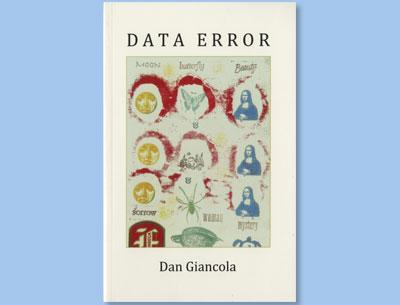At Home in America

“Data Error”
Dan Giancola
Street Press, $15
In terms of literature, art, and society, we have left the postmodern building. What comes next is already well under construction, if not completely built. The new era has been called many things, post-humanism being one of the more provocative. Yet an even better term serves for context while reading Dan Giancola’s new collection of poetry, “Data Error,” and that is late elegiac.
Mr. Giancola, whose biography on the back of the book states, “Blah, blah, blah about the author” under a boxy cartoon figure that looks suspiciously like an etching on a men’s room wall, is highly effective at delivering his elegies without letting too much seriousness get in the way. Yet “Data Error” is an unflinching record of a disturbance that gradually turns into a bacchanalia of gleeful language, but only after careful, measured deliberation.
The collection opens with a tribute to the late Robert Long, a beloved local poet and longtime East Hampton Star writer and editor. The lines are crisp and clear:
A steel wool sky scours
the roof, rain on the skylight
keys a familiar but forgotten tune.
The poem’s sentiment is heartfelt, precise, and foreshadows much of what is to come in “Data Error.” Mr. Giancola is long on thought yet delightfully succinct in metrical performance. He knows and demonstrates well the economy of words, deftly accomplishing more with less. “For Robert Long” ends with a poignant distillation:
Leaves drain into the street.
Another friend is gone.
I’ll have to live longer, & harder.
Succeeding poems follow up on the initial tenor of loss, as if the poet wished to get suffering out of the way in order to proceed to lighter, yet equally weighed, subjects. The theme of separation, mostly bitter, rages in poems like “Good Luck,” “Lovely Failure,” “Marriage,” and “Someone.” They are some the most interesting poems in the collection, perhaps for their raw emotion and futile attempt to wrestle with the fallout of painful goodbyes. Those poems are also when “Data Error” strains to make sense of the world, and we acutely feel what it is like when love and happiness fail.
I despised clutter, you hated dirt.
Now when we kiss, we bleed.
Those above lines from “Something Human” do not show how to span the divide between souls with disparate aims, but they do function as a definitive release from an untenable situation. The poet strikes out to find himself again. He no longer grasps at meaning that is not there. Instead, he seizes the will to go on, one day growing courageous enough to ask:
Full moon in the creel
of dogwood trees. Will
anyone love me again?
There are four poems in “Data Error” by the title “To Do List,” followed by a numeral. They become a rebellious refrain in which Mr. Giancola turns the tragic back on itself, into near banality. Rampant wordplay characterizes the “To Do List” poems, to the detriment of narrative continuity, yet they exhibit a sheer playfulness that quickly asserts a freedom from melodrama. This style of poetics, often referred to as language poetry, shows a lyrical virtuosity that tends toward the nonsensical:
. . . Let’s this & that. Let’s pay cash. Let’s
purge the puritanical, challenge evangelical
piety. Let’s meander, sample local potables.
It is an unavoidable feature in Mr. Giancola’s work that does come with a payoff. There is a refreshing sarcasm in such poems as “Slogos” (a portmanteau of slogan and logos), “Puppet Show,” and “Poem Found in Dylan Titles,” where familiar language comes alive like lyrics to a favorite song, savored in a new way. The vocabulary is fresh, energetic, and toys with a new idiom while acknowledging the timeless. From the poem “Riskier”:
We eat paninis
quaff acai juice, drive diesels
but nothing, really, has changed.
Acknowledge the end and move on.
After struggling through emotional dissonance to re-establish his voice, then warming up to all the possibilities in words, the poet discovers a state of peace in a series of poems at home in America. And with the initial dissonance patched, and rupture healing, you can taste the ripe beauty of acceptance. Poems like “Tomatoes,” “Sandias Day Hike,” and the graceful “Trouble With Chopsticks” cohere in a solid lucidity. The poet senses a quiet, natural victory outside the incessant clashing of society. From “Swoon”:
When blue flames consume
your reference frame, swoon
into that wound. Slip that self
off like a shoe. Nothing new
without subtraction. Feel that?
Ethereal arms torque you into change.
What’s born anew is often borne in pain.
The book acknowledges a central frustration in life: how to communicate with each other, and our selves, during unusual periods in time, when our identities as human beings must change. Mr. Giancola turns nonchalant phrases into formal revelations, letting his poetic mastery mask a darkness that is nearly impossible to face alone. “Data Error” will bring a smile to even the most cynical, wintry heart.
You’ll get blue when to the usual you hew.
Fashion a new fashion.
Don’t do what comes easily for you.
(From “Warm Bowl”)
Lucas Hunt’s second collection of poems, “Light on the Concrete,” came out last year. He lives in Springs, where he works at a literary agency.
Dan Giancola teaches English at Suffolk Community College in Riverhead. He lives in Mastic.
